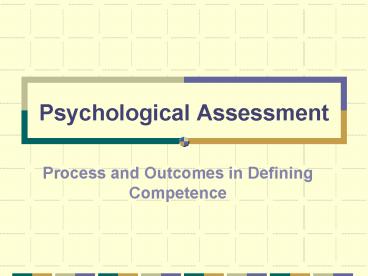Psychological Assessment - PowerPoint PPT Presentation
1 / 15
Title:
Psychological Assessment
Description:
Psychological Assessment. Process and Outcomes in Defining Competence. Authors. Karen R. Cohen, Canadian Psychological Association. Leon VandeCreek, Wright State ... – PowerPoint PPT presentation
Number of Views:104
Avg rating:3.0/5.0
Title: Psychological Assessment
1
Psychological Assessment
- Process and Outcomes in Defining Competence
2
Authors
- Karen R. Cohen, Canadian Psychological
Association - Leon VandeCreek, Wright State University
- Radhika Krishnamurthy, Florida Institute of
Technology
3
Are Psychologists Conducting Assessments?90
Personality assessments66 Intellectual
assessments15 Vocational/career13
Ability/aptitudeSource Watkins, Campbell,
Nieberding, Hallmark, 1995
4
Distinction Between Testing and
AssessmentAssessment involvesUsing multiple
sourcesBeing aware of multiple
causationEvaluating hypothesesDrawing
inferencesGenerating comprehensive
understanding
5
Erosion in Doctoral TrainingDecline in required
coursework-Only 25 of clinical and counseling
students receive sufficient training,
especially in report writing-Most doctoral
programs do not include a full range of
assessment topics such as interviewing,
testing, diversity issues, etc
6
What about Internship Training?-90 retained or
increased training in assessment-56 found it
necessary to provide basic training
7
Schism Between Training and Practice-Practice
seems unrelated to academic attitudes-Market
place demands and reimbursement restrictions
have not impacted training
8
Four Broad Questions1. What are the core
components of competence in assessment?2.
What are the critical educational and
training experiences?3. What are the strategies
for evaluation?4. What action items will move
forward the assessment competency?
9
Q 1Components of Competence1. Knowledge of
psychometric theory2. Understanding of
scientific, theoretical, empirical, and
contextual bases of assessment3. Development of
knowledge, skills, and techniques to assess
cognitive, affective, behavioral, and
personality dimensions4. Ability to assess
outcomes5. Ability to evaluate multiple roles,
contexts and relationships within which
clients function6. Ability to establish,
maintain, and understand the collaborative
relationship for assessment
10
Q1Components of Competencecont.7. Develop
technical assessment skills a. Problem
identification and case
conceptualization b. Selection of assessment
methods c. Application of procedures d.
Systematic data gathering e. Integration of
information f. Communication of findings g.
Provision of useful feedback
11
Q 2 Training Experiences1. Academic courses
Broad range of models2. Practicum training
Consistent with graduate programs model of
training -Individual and group
supervision -Intensive in nature -Organized
with experienced mentor3. Integration of
coursework and practicum4. Taught in a coherent
and cumulative manner
12
Q 3 Strategies for EvaluationThree
Principles1. Focus on a comprehensive and
integrated set of assessment activities from
initial interviews, testing, and intervention
to outcome evaluation2. Should reflect core
competencies and methods of training3.
Should be individualized and provide
meaningful feedback to the student
13
Q 3 Strategies for EvaluationMethods of
Evaluation1. Classroom performance2. Direct
observation of work3. Summative performance
evaluation4. Self assessment5. Collaborative
assessments such as use of 360-degree
surveys
14
Moving Forward1. Attend to assessment of
groups, systems, and organizations, and their
impact on individuals2. Develop guidelines for
supervision parallel to those for
psychotherapy supervision3. Increase diversity
considerations in assessment training4.
Encourage programs to strengthen prerequisites
15
5. Address schism between academic and
practice settings6. Encourage training programs
to incorporate technological advances7.
Encourage test developers to incorporate
innovations in technology8. Advocate with
insurers, employers, etc for the
cost-effectiveness of assessment9. Encourage
accreditation bodies to recognize diverse
methods for teaching assessment































